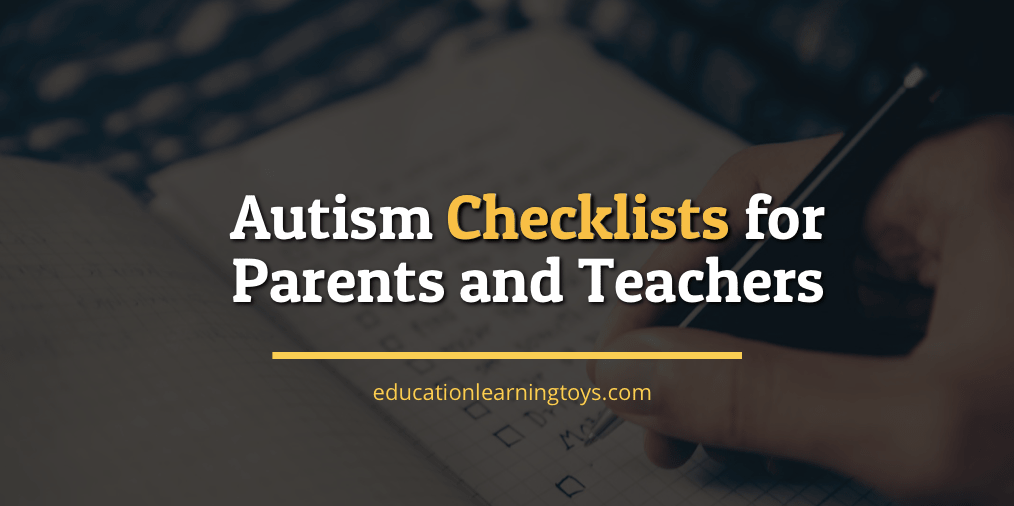What is autism?
Autism is often called an autistic spectrum, because it’s wide-ranging, some people may have very mild symptoms of it; whilst others may have very severe. This can mean that some people with autism may have learning disabilities, and little or no verbal skills. Other people with autism can be highly intelligent and use complex correct speech.
Autism can affect the way that people communicate with others and their social skills. Autism is something that will affect a person for life, but there are various strategies that can help a person with autism to manage and cope in situations, and so that they develop well and achieve the best they possibly can. Autism can include Asperger’s syndrome, and Pathological Demand Avoidance (PDA).
Because parents spend a lot of time with their children, and especially in the early years, they’re often the people who will notice their child’s differences and delays. So, below you’ll find an autism checklist for parents, an autism checklist for 3yr olds, information about an autism screening test, an autism checklist for adults.

Autism checklist for parents
- Does the child display obsessive behavior, with interests or people?
- Does the child show restricted and repetitive patterns of behavior?
- Does the child have difficulty processing sound, sight, smell, taste and touch?
- Does the child have difficulty controlling their emotions, especially anger?
- Does the child use sever avoidance strategies, such as distraction or excuses?
- Does the child have meltdowns?
- Was/Is the child’s speech delayed compared to their peers?
- Does the child take things literally, such as sarcasm, jokes, teasing, and language?
- Does the child take time to process what they hear?
- Is the child comfortable with role play?
If you have a child who is around 3 years old, you may want to know if the behavior they’re displaying is showing typical signs of autism in a 3year old. There’s a brief checklist below, of things you could look out for as a parent, of a 3yr old:

Autism checklist for 3 year olds
- Does the child drop toys?
- Does the child fail to reach for toys, people, or items?
- Does the child spend time just watching, rather than doing?
- Is the child delayed in reaching milestones compared to peers?
- Does the child resist, and want everything on their own terms?
- Does the child role-play or mimic in a repetitive way?
Autism Screening Test
If a child is showing any of these signs, it’s worth having them screened for autism, just to check:
- If a child is not babbling by 1 year
- If a child is not making any gestures of pointing, waving hello or goodbye by 1 year
- if a child is not saying single words by 16 months
- if a child is not saying two-words by themselves (without a person prompting them to repeat) by 2 years
There are specific screening tools that can help children with autism, the screening tools can’t give a diagnosis, but they can highlight children who would benefit from a thorough assessment with a specialist. There are different tests for toddlers, or children such as The Childhood Autism Spectrum Test (CAST); the Modified Checklist for Autism in Toddlers (M-CHAT), or the Screening Tool for Autism in Toddlers and Young Children (STAT).

Autism Checklist for Teachers
If you have a child, or children with autism in your classroom, there are small adjustments you can make that will make a big difference to their lives. So, this checklist included here, isn’t a checklist to determine whether a child may have autism, and there are plenty of those included here already. This checklist is for things you can do as a teacher to check that you’re doing all you can to help students with autism.
By using the following techniques, you may help autistic students feel more supported, and go on to achieve more in life. It can reduce children being excluded from school too, due to their behavior.
- Do you use a routine that has been mutually agreed with the student?
- Have you ensured that you have prepared your autistic students for any changes to their routine?
- Do you use visual supports for students with autism?
- Do you simplify your communication and allow them time to process what you say and request?
- Do you include social stories?
- Do you allow students to wear ear-defenders if these help?
- Can you incorporate their intense/repetitive interests into lessons to make them relevant to them?
- Do you teach autism awareness to all students?
- Is there a safe space for students with autism to go to if they feel overloaded?
- Do you introduce social skills into the classroom, encouraging talking and social speaking?
Autism Checklist for Adults
Sometimes people associate autism with children. But children grow up into adults, and that autism doesn’t disappear. Adults may have learned coping mechanisms throughout their life. But, there could be some checklist points that may be highlighted:
- Are they OK in 1:1 situations but find groups overwhelming?
- Do they find it hard to understand the emotions/thoughts of others?
- Do they find it hard to make and keep friends?
- Do they find it hard to find a job they enjoy, or stay in work?
- Do they have hobbies that take up a lot of their time?
- Do they find changes difficult/hard?
- Do they have trouble making appropriate conversation?
- Do they need routines?
- Do they seem pedantic?
To conclude, there’s a variety of different lists of traits and characteristics and behavior that people with autism could display at various points throughout their life. None of these checklists are a firm diagnosis; but if someone displayed many of these traits, it could certainly worth getting them assessed by a professional. The teacher’s checklist is a list of things they could incorporate in their classes, to make things easier for children’s with autism.




